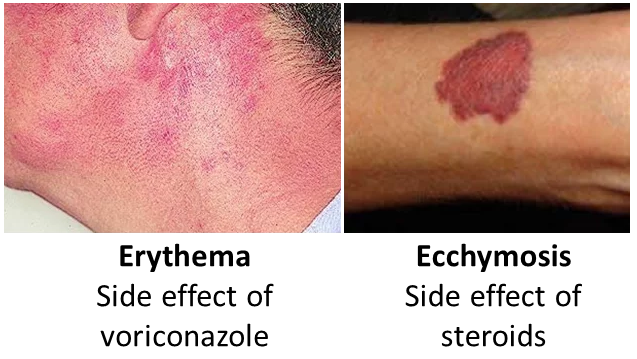Every medication or treatment comes with a risk of side effects, which are also known as ‘adverse events’. The risks are often higher for people who take lots of different medications together or who take medicines such as prednisolone for a long time. Your doctor will help you to decide which combination of treatment options is safest for you.
Always read the patient information leaflet (these can be found at the bottom of the Antifungals page) that comes with your medication to see what side effects you can expect. If you have lost this leaflet, you can look up your medication using the electronic medicines compendium.
You will recognise the name of some side effects (headache, nausea, fatigue). Others may sound quite exotic but they are usually complicated words for something simple. You can ask your doctor or pharmacist what they mean. For example: ‘pruritis’ means itching, ‘anuresis’ means being unable to wee, and ‘xerostomia’ means dry mouth.

Clinical trials measure how often different side effects happen, and this is reported in a standardised way:
- Very common: more than 1 in 10 people are affected
- Common: between 1 in 10 and 1 in 100 people are affected
- Uncommon: between 1 in 100 and 1 in 1,000 people are affected
- Rare: between 1 in 1,000 and 1 in 10,000 people are affected
- Very rare: fewer than 1 in 10,000 people are affected
How to minimise side effects:
- Follow the instructions in the patient information leaflet that comes with your medication, particularly about what time to take the medication, or whether to take it on a full or empty stomach.
- Try to take prednisolone in the morning to reduce the risk of insomnia, and in the middle of a meal to reduce stomach irritation and heartburn.
- Your doctor may prescribe you another kind of medication to reduce the side effect, for example PPIs (proton pump inhibitors) for stubborn heartburn.
Many supplements or complementary therapies claim to have no side effects because they are ‘all natural’, but this is untrue. Anything that has an effect can have a side effect. For example, St John’s Wort is a herbal remedy that can help with mild depression, but there is a small risk of developing cataracts. Our Facebook support group is a good place to ask questions about other patients’ experiences with different treatments, or ask the NAC team to fact-check the effectiveness and safety of complementary therapies you are thinking of trying.
Reporting side effects
Many of the drugs that aspergillosis patients take can cause side effects. Most of these will be well reported, but some may not have been identified. Here’s what to do if you are experiencing side effects.
First tell your doctor, in case you need to stop taking the medication, or so they can help you manage the side effects.
Also if you think it is a new or unreported side effect please let Graham Atherton (graham.atherton@manchester.ac.uk) at the NAC know, so that we can keep a record.
UK: In the UK, the MHRA have a Yellow Card scheme where you can report side effects and adverse incident of medications, vaccines, complementary therapies and medical devices. There is an easy online form to fill in – you do not need to do this via your doctor. If you need help with the form, reach out to someone at NAC or ask someone in the Facebook support group.
US: In the US, you can report side effects directly to the FDA via their MedWatch scheme.
